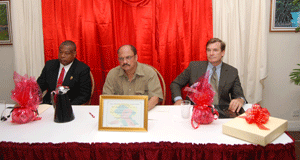ANNA Regina Secondary yesterday won the fourth Secondary Schools’ Hydroponics Competition.
 This was disclosed at the official closing and prize presentation ceremony in Saint Joseph High School, Georgetown.
This was disclosed at the official closing and prize presentation ceremony in Saint Joseph High School, Georgetown.
St. Rose’s High, Buxton Secondary, Number 29 Secondary, Berbice High, Uitvlugt Secondary and Linden Foundation placed second, third, fourth, fifth, sixth and seventh, respectively.
The contest was sponsored by the Inter-American Institute for Cooperation on Agriculture (IICA), in collaboration with United Nations Food and Agriculture Organisation (UNFAO), Partners of the Americas and the Ministries of Education and Agriculture.
Students from 42 secondary schools, in Regions 2 (Pomeroon/Supenaam), 3 (Essequibo Islands/West Demerara), 4 (Demerara/Mahaica), 5 (Mahaica/Berbice), 6 (East Berbice/Corentyne) and 10 (Upper Demerara/ Upper Berbice), participated and were placed in seven clusters, based on geographic location. A winner was chosen from each of the geographic locations to take part in the finals.
The seven finalists were St. Rose’s High, Berbice High, Uitvlugt Secondary, Linden Foundation, Number 29 Secondary, Buxton Secondary and Anna Regina Secondary.
The competition was divided in two phases, training for teachers and students and the actual preparation and planting of the various schools’ hydroponic gardens. Over a period of six weeks, the participating groups, who cultivated pakchoi and poi calaloo, lettuce and celery, were visited at their schools and evaluated by a team of agriculturists.
Speaking at yesterday’s ceremony, Assistant Chief Education Officer, Mrs. Doodmattie Singh said the ministry is very grateful for its partnership with the various organisations, noting that the ministry could not have done it on its own.
She said there has been an increase in the number of schools involved in this competition, pointing out that 15, 27 and 36 took part in the three previous ones.
Benefits
Present at the function too was the Competition Patron, First Lady Deolatchmee Ramotar, who said the rivalry rekindles interest in agriculture, allows students to be aware of health and the environment and receive both tangible and intangible benefits.
She added that the competition permitted a balance of theory and practice and also taught the students the importance of preparation as “what you sew is what you reap.”
The First Lady remarked that agriculture is vital to the future of Guyana and thanked the students for their participation in the competition, stating that they have done themselves, their teachers and their parents proud.
She also thanked all the teachers and parents for their encouragement throughout the process.
Country Representative UNFAO, Dr. Lystra Fletcher-Paul said the competition is only one component of a bigger project entitled ‘Expansion of hydroponics activities in Guyana’ her agency is collaboratively funding with IICA.
She said the first phase is training workshops, the second would be establishment of five hydroponic units and the final phase will be transplanting the seedlings of selected crops into the growing stage under the supervision of IICA.
Fletcher-Paul said hydroponics exposes students to new climate smart technology, is a viable means of income generation and facilitates the students to see the practical application of the theory which they learn in text books.
She urged them to share their experiences with their colleagues as well as get their parents involved.
Permanent Secretary in the Ministry of Agriculture, Mr. George Jervis acknowledged that IICA has, once again, demonstrated its good corporate citizenship, by sponsoring the competition.
He told the students that they are all winners, because they were chosen in their different regions and exposed to cultivation using the hydroponics technology.
Purpose
Jervis said the real purpose of the competition is for the students to replicate exactly what they have done in their cultivation using the technology.
He encouraged them to practice the technology not only in schools but in their homes as well and encouraged them to start getting involved in agriculture for business, as it is not too soon to start making money.
According to him, there has been a marked increase in non- communicable diseases in the Caribbean and hydroponics gives them the opportunity to cultivate safe and wholesome foods.
He also challenged the schools to work with IICA and other partners in an effort to practice hydroponics technology, with the willing help of the Ministry of Agriculture.



.jpg)








